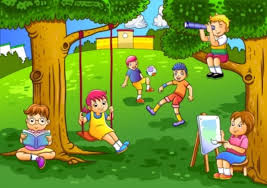
Exploring the Enchanting World of Children’s Games
The Magic of Children’s Games
Children’s games are more than just fun activities – they play a crucial role in a child’s development and growth. From traditional games that have been played for generations to modern digital games, the world of children’s games is vast and diverse.
Benefits of Playing Games
Playing games can help children develop essential skills such as problem-solving, teamwork, creativity, and critical thinking. Through games, children learn to communicate, negotiate, and strategize – all while having a great time.
Types of Children’s Games
There are countless types of children’s games, ranging from physical outdoor games like tag and hide-and-seek to indoor board games and video games. Each type of game offers unique benefits and experiences for children.
Outdoor Games
Outdoor games encourage physical activity and social interaction. They help children build gross motor skills, coordination, and stamina. Popular outdoor games include hopscotch, skipping rope, football, and many more.
Board Games
Board games promote cognitive skills such as memory retention, decision-making, and strategic thinking. They also teach children about rules, fairness, and patience. Classic board games like Snakes and Ladders, Chess, and Monopoly are timeless favourites.
Video Games
Video games offer immersive experiences that can enhance hand-eye coordination, problem-solving abilities, and spatial awareness. With a wide variety of educational and entertaining video games available today, children can explore virtual worlds while learning valuable skills.
The Importance of Playtime
In today’s fast-paced world, it is essential to prioritise playtime for children. Through play and games, children can express themselves creatively, relieve stress, build confidence, and form lasting friendships.
In Conclusion
Children’s games are not just sources of entertainment; they are powerful tools for learning and growth. Whether playing outdoors with friends or solving puzzles on a screen, every game experience contributes to a child’s development in unique ways.
Benefits of Children’s Games: Fostering Social Skills, Cognitive Growth, Physical Activity, Creativity, and Life Lessons
- Promote social interaction and teamwork skills
- Enhance cognitive abilities such as problem-solving and critical thinking
- Encourage physical activity and development of motor skills
- Provide opportunities for creativity and imagination to flourish
- Help children learn important life lessons such as patience, resilience, and sportsmanship
Potential Drawbacks of Children’s Games: Screen Time, Content Concerns, and Social Impacts
- Excessive screen time from playing video games can lead to eye strain and sedentary behaviour.
- Some children’s games may promote unhealthy competition and discourage cooperation.
- Certain video games may contain violent or inappropriate content that is not suitable for young children.
- Playing too many games can potentially interfere with a child’s academic performance and social interactions.
- Children may become overly dependent on games for entertainment, affecting their ability to engage in other activities.
Promote social interaction and teamwork skills
Children’s games play a vital role in promoting social interaction and teamwork skills among young individuals. Through playing games with their peers, children learn to communicate effectively, collaborate, and work towards common goals. These experiences help them develop important social skills such as empathy, cooperation, and leadership. By engaging in group activities and team-based games, children not only have fun but also learn the value of working together towards shared objectives, fostering a sense of camaraderie and mutual support that will benefit them throughout their lives.
Enhance cognitive abilities such as problem-solving and critical thinking
Children’s games play a vital role in enhancing cognitive abilities such as problem-solving and critical thinking. Through engaging in games that require strategic decision-making and logical reasoning, children can sharpen their minds and develop valuable skills that will benefit them in various aspects of their lives. By tackling challenges, making choices, and analysing outcomes within the context of games, children not only have fun but also strengthen their cognitive capabilities in a stimulating and enjoyable way.
Encourage physical activity and development of motor skills
Children’s games play a vital role in encouraging physical activity and the development of motor skills. Engaging in games that involve running, jumping, and coordination not only keeps children active but also helps them enhance their gross and fine motor skills. Whether playing outdoor games like tag or participating in structured sports activities, children have the opportunity to strengthen their muscles, improve balance, and refine their movements through play. This physical aspect of games not only contributes to children’s overall health and well-being but also fosters a lifelong appreciation for an active lifestyle.
Provide opportunities for creativity and imagination to flourish
Children’s games provide valuable opportunities for creativity and imagination to flourish. When children engage in play, whether through building with blocks, creating make-believe worlds, or inventing new rules for a game, they are exercising their imaginations and exploring endless possibilities. Through games, children can express themselves freely, think outside the box, and develop innovative ideas. This creative outlet not only fosters artistic skills but also nurtures problem-solving abilities and encourages a sense of wonder and curiosity in young minds. By embracing the imaginative aspects of children’s games, we empower children to dream big and think creatively in all aspects of their lives.
Help children learn important life lessons such as patience, resilience, and sportsmanship
Children’s games play a vital role in helping young ones learn important life lessons such as patience, resilience, and sportsmanship. Through playing games, children experience challenges and setbacks that teach them the value of perseverance and patience. They learn to bounce back from failures, developing resilience in the face of adversity. Moreover, games provide opportunities for children to practice good sportsmanship by learning to win graciously and lose gracefully, fostering respect for others and teamwork skills that are essential in all aspects of life.
Excessive screen time from playing video games can lead to eye strain and sedentary behaviour.
Excessive screen time from playing video games can have negative consequences for children, including eye strain and sedentary behaviour. Prolonged exposure to screens can cause discomfort, dryness, and fatigue in the eyes, potentially leading to long-term vision problems. Moreover, spending extended periods sitting and playing video games can contribute to a sedentary lifestyle, which is associated with health issues such as obesity and reduced physical fitness. It is important for parents and caregivers to monitor and limit screen time to ensure that children maintain a healthy balance between gaming and other activities that promote physical movement and overall well-being.
Some children’s games may promote unhealthy competition and discourage cooperation.
Some children’s games may inadvertently foster unhealthy competition among young players, leading to a lack of cooperation and teamwork. When games focus solely on winning at all costs, children may prioritise individual success over collaborative efforts. This can hinder the development of essential social skills and empathy, as well as create a negative atmosphere where winning becomes the sole measure of success. It is crucial for parents and educators to guide children towards games that promote healthy competition, encourage teamwork, and emphasise the value of cooperation to ensure a positive gaming experience that nurtures both individual growth and collective harmony.
Certain video games may contain violent or inappropriate content that is not suitable for young children.
Certain video games may pose a con for children as they may contain violent or inappropriate content that is unsuitable for young audiences. Exposure to such content can have a negative impact on children’s mental and emotional well-being, potentially desensitising them to violence or promoting aggressive behaviour. It is crucial for parents and caregivers to monitor and regulate the types of video games their children are playing to ensure they are engaging with age-appropriate and positive content that aligns with their values and promotes healthy development.
Playing too many games can potentially interfere with a child’s academic performance and social interactions.
Playing an excessive amount of games can pose a significant challenge for children, as it may lead to a decline in academic performance and hinder their social interactions. When children spend too much time playing games, they may struggle to focus on their studies, complete homework assignments, or engage in other educational activities. Additionally, excessive gaming can limit opportunities for face-to-face interactions with peers, family members, and teachers, impacting the development of crucial social skills and emotional intelligence. Finding a balance between game time and other important aspects of a child’s life is essential to ensure their overall well-being and success in both academic and social settings.
Children may become overly dependent on games for entertainment, affecting their ability to engage in other activities.
One significant drawback of children’s games is the risk of developing overdependence, where children may rely excessively on games for entertainment, potentially hindering their engagement in other activities. This dependency can lead to a reduction in time spent on essential tasks such as homework, physical exercise, or social interactions. When children become overly reliant on games for amusement, it may impact their overall development by limiting exposure to diverse experiences and skills outside the virtual world. Balancing game time with a variety of activities is crucial to ensure a well-rounded and healthy lifestyle for children.



